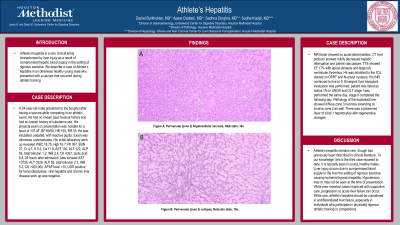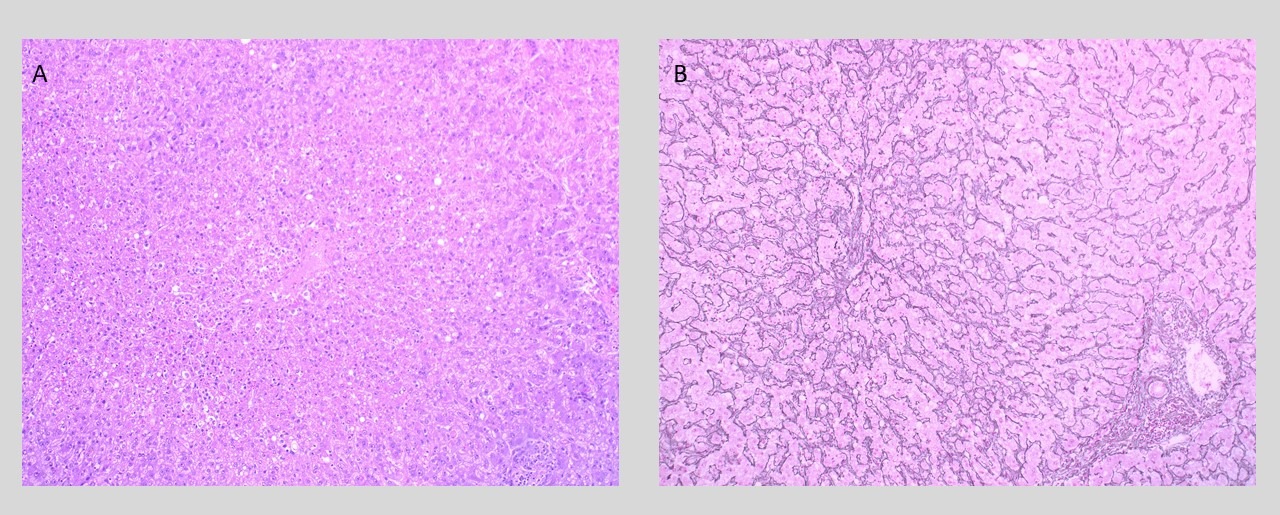Monday Poster Session
Category: Liver
P3146 - Athlete's Hepatitis
Monday, October 28, 2024
10:30 AM - 4:00 PM ET
Location: Exhibit Hall E

Has Audio
- DB
Daniel Burkholder, MD
Houston Methodist Hospital
Houston, TX
Presenting Author(s)
Daniel Burkholder, MD1, Apaar Dadlani, MBBS1, Sudha Kodali, MD, MSPH1, Sadhna Dhingra, MD2
1Houston Methodist Hospital, Houston, TX; 2Houston Methodist, Houston, TX
Introduction: Athlete’s hepatitis is a rare clinical entity characterized by liver injury as a result of compromised hepatic blood supply in the setting of rigorous exercise. We describe a case of Athlete’s hepatitis in an otherwise healthy young male who presented with a seizure that occurred during athletic training.
Case Description/Methods: A 24 year old male presented to the hospital after having a seizure while competing in an athletic event. He had no known past medical history and had no known history of substance use. His physical exam on presentation was notable for a fever of 107.4F, BP 80/50, HR 150, RR 33. He was intubated, sedated, with reactive pupils. Exam was otherwise unremarkable. His initial laboratory work up revealed WBC 18.75, Hgb 16.7, Plt 367, BUN 27, Cr 4.1, K 5.5, Ca 11.8, AST 130, ALT 122, ALP 59, total bilirubin 1.2, INR 3.4, CK 4357, lactic acid 6.8. 24 hours after admission, labs showed AST >3750, ALT 3329, ALP 59, total bilirubin 2.7, INR 5.3, CK >200,000, APAP level < 10, UDS positive for benzodiazepines, viral hepatitis and chronic liver disease work up was negative. MRI brain showed no acute abnormalities. CT scan showed mildly decreased hepatic attenuation and patent vasculature. TTE showed EF 17% with apical akinesis and large left ventricular thrombus. He was admitted to the ICU, started on CRRT and N-acetyl cysteine. His INR continued to rise to 9. Emergent liver transplant evaluation was performed, patient was listed as status 1A on UNOS and OLT stage I was performed the same day, stage II completed the following day. Pathology of the explanted liver showed diffuse zone 3 necrosis extending to involve zone 2 as well. There was a preserved layer of zone 1 hepatocytes with regenerative changes.
Discussion: Athlete’s hepatitis remains rare, though has previously been described in clinical literature. To our knowledge, this is the third case reported to date. It has historically been seen in young, healthy males. Liver injury occurs due to compromised blood supply to the liver the setting of rigorous exercise causing ischemic/hypoxic hepatitis. Hypotension may or may not be seen at the time of presentation. While prior reported cases improved with supportive care, progression to acute liver failure, as seen in our case, can occur. While rare, athlete’s hepatitis should be considered in undifferentiated liver failure, especially in individuals who participate in physically rigorous athletic training or competitions.

Disclosures:
Daniel Burkholder, MD1, Apaar Dadlani, MBBS1, Sudha Kodali, MD, MSPH1, Sadhna Dhingra, MD2. P3146 - Athlete's Hepatitis, ACG 2024 Annual Scientific Meeting Abstracts. Philadelphia, PA: American College of Gastroenterology.
1Houston Methodist Hospital, Houston, TX; 2Houston Methodist, Houston, TX
Introduction: Athlete’s hepatitis is a rare clinical entity characterized by liver injury as a result of compromised hepatic blood supply in the setting of rigorous exercise. We describe a case of Athlete’s hepatitis in an otherwise healthy young male who presented with a seizure that occurred during athletic training.
Case Description/Methods: A 24 year old male presented to the hospital after having a seizure while competing in an athletic event. He had no known past medical history and had no known history of substance use. His physical exam on presentation was notable for a fever of 107.4F, BP 80/50, HR 150, RR 33. He was intubated, sedated, with reactive pupils. Exam was otherwise unremarkable. His initial laboratory work up revealed WBC 18.75, Hgb 16.7, Plt 367, BUN 27, Cr 4.1, K 5.5, Ca 11.8, AST 130, ALT 122, ALP 59, total bilirubin 1.2, INR 3.4, CK 4357, lactic acid 6.8. 24 hours after admission, labs showed AST >3750, ALT 3329, ALP 59, total bilirubin 2.7, INR 5.3, CK >200,000, APAP level < 10, UDS positive for benzodiazepines, viral hepatitis and chronic liver disease work up was negative. MRI brain showed no acute abnormalities. CT scan showed mildly decreased hepatic attenuation and patent vasculature. TTE showed EF 17% with apical akinesis and large left ventricular thrombus. He was admitted to the ICU, started on CRRT and N-acetyl cysteine. His INR continued to rise to 9. Emergent liver transplant evaluation was performed, patient was listed as status 1A on UNOS and OLT stage I was performed the same day, stage II completed the following day. Pathology of the explanted liver showed diffuse zone 3 necrosis extending to involve zone 2 as well. There was a preserved layer of zone 1 hepatocytes with regenerative changes.
Discussion: Athlete’s hepatitis remains rare, though has previously been described in clinical literature. To our knowledge, this is the third case reported to date. It has historically been seen in young, healthy males. Liver injury occurs due to compromised blood supply to the liver the setting of rigorous exercise causing ischemic/hypoxic hepatitis. Hypotension may or may not be seen at the time of presentation. While prior reported cases improved with supportive care, progression to acute liver failure, as seen in our case, can occur. While rare, athlete’s hepatitis should be considered in undifferentiated liver failure, especially in individuals who participate in physically rigorous athletic training or competitions.

Figure: Figure A: Perivenular (zone 3) hepatocellular necrosis. H&E stain. 10x.
Figure B: Perivenular (zone 3) collapse. H&E stain. 10x
Figure B: Perivenular (zone 3) collapse. H&E stain. 10x
Disclosures:
Daniel Burkholder indicated no relevant financial relationships.
Apaar Dadlani indicated no relevant financial relationships.
Sudha Kodali: ASTRAZENECA – Advisory Committee/Board Member. GILEAD – Speakers Bureau. SIRTEX – Advisory Committee/Board Member.
Sadhna Dhingra indicated no relevant financial relationships.
Daniel Burkholder, MD1, Apaar Dadlani, MBBS1, Sudha Kodali, MD, MSPH1, Sadhna Dhingra, MD2. P3146 - Athlete's Hepatitis, ACG 2024 Annual Scientific Meeting Abstracts. Philadelphia, PA: American College of Gastroenterology.
